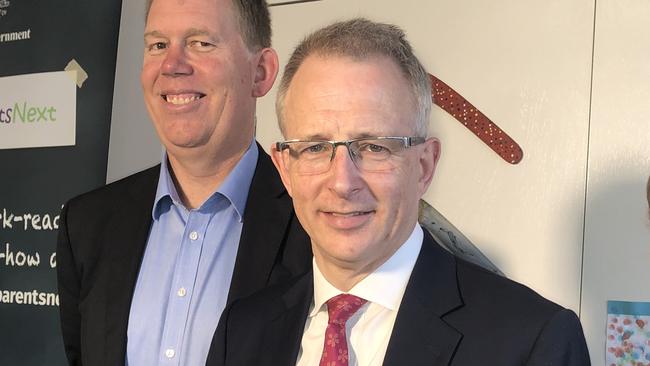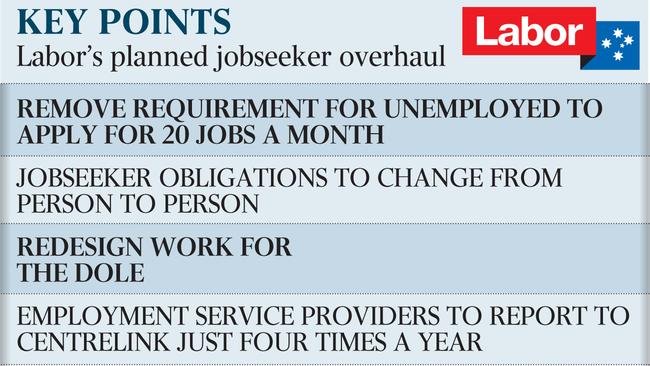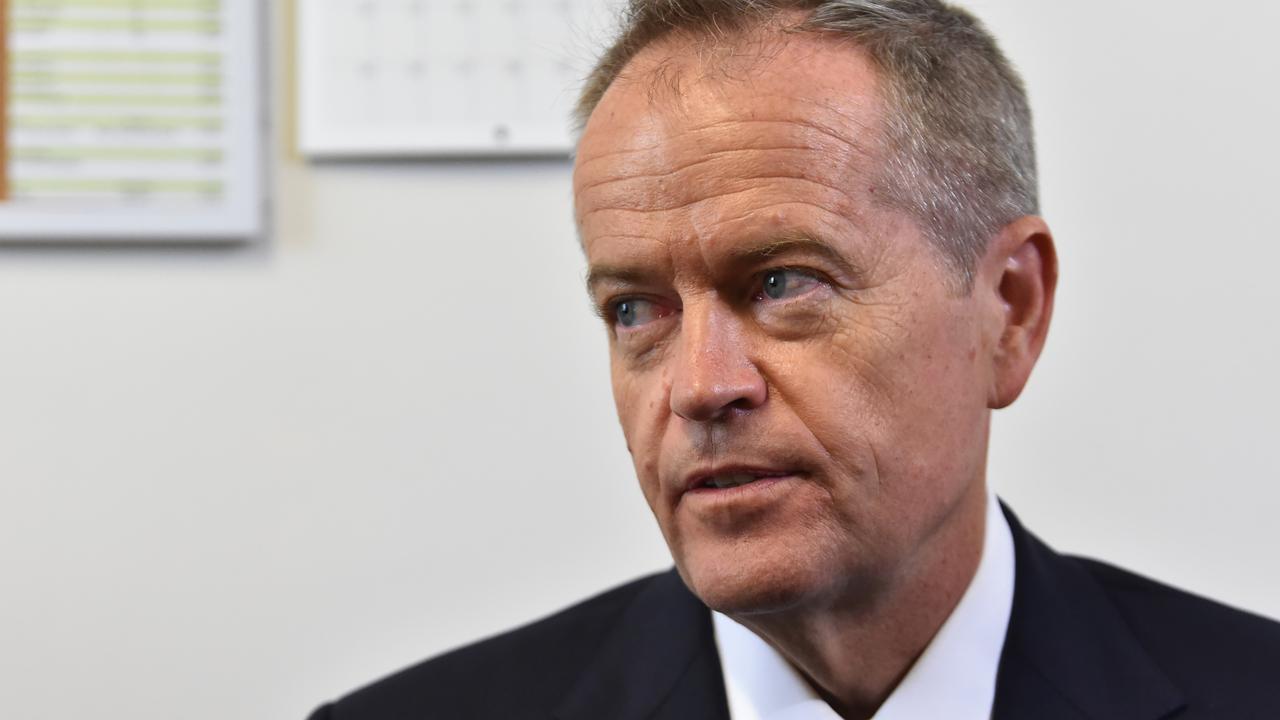Coalition slams Labor job welfare reform plan
Coalition accuses Labor of wanting to junk mutual obligations in the welfare system as Tony Abbott tweets his anger.

The Coalition has slammed a proposal by Bill Shorten’s opposition to reform mutual obligations in the welfare system, accusing Labor of wanting to “junk” the principle and increase spending on benefits.
Social Services Minister Paul Fletcher seized on a report in The
Australian today saying Labor wants to “consign many more Australians
to a life of welfare dependency.”
“Labor’s plan means welfare payments would balloon again and they’d be paid for by higher taxes on those working,” he said.
Mr Fletcher addressed the media in Sydney shortly after lunchtime today as former prime minister Tony Abbott tweeted that applying for “one job a day is hardly unreasonable.”
People on unemployment benefits are supposed to be looking for work. Applying for one job a day is hardly unreasonable. These proposed changes show Labor is now the welfare class party not the working class one.
— Tony Abbott (@TonyAbbottMHR) January 8, 2019
“People on unemployment benefits are supposed to be looking for work,” he said.
“These proposed changes show Labor is now the welfare class party not the working class one.”


Labor plans job welfare overhaul
Labor has revealed a blueprint for a “revamped version of mutual obligation” that does not punish jobseekers, ditches the need for unemployed people to apply for 20 jobs a month and redesigns Work for the Dole.
The opposition’s employment services spokeswoman Terri Butler told The Australian the current system annoys businesses, does little to help unemployed people find work and often stands in the way.
Business has backed the thrust of Ms Butler’s proposed reforms, which means major changes to the system are likely if Bill Shorten becomes prime minister after the May election.
“The way they (unemployed people) are being treated is a product of the business model, which is a product of the government’s mutual obligations,” Ms Butler said. “Change the obligations and you change the way people are treated.”
The $7 billion Jobactive system — a network of private and non-government employment service providers — is ostensibly funded to help working-age people in receipt of welfare payments find work, but Ms Butler says it has become mired in “box-ticking”.

The Business Council of Australia agrees, saying employers bear the cost of “sorting through unsuitable applications” submitted for the purpose of meeting job-search requirements. “Job-search requirements of 20 applications a month can impose unnecessary costs on jobseekers and employers, where applicants are not suitable for vacant positions,” the council says in a submission to the federal government’s review of employment services.
Council of Small Business of Australia chief executive Peter Strong told The Australian some businesses won’t hire people referred from employment service providers because it is an “absolute waste of time”.
“We are creating millionaires on the back of the long-term unemployed by paying providers to offer a failed service,” he said.
“The people that win are the service providers, not the unemployed or the employers. It beggars belief that we have this very textbook-driven view of how these things should happen when that is wrong and it is proven to be wrong. The whole system needs to be turned on its head.”
The Australian understands Ms Butler would free up money within the existing allocation for Jobactive by pushing the requirement of providers to report to Centrelink fortnightly or monthly to just four times a year, and swap the “prescriptive” obligation for jobseekers to apply for 20 jobs a month for a “qualitative” one that would change person to person.
“A better employment services framework would see less onerous compliance obligations imposed on providers and their unemployed clients, performance indicators related to building relationships within local labour markets, industries and communities, and funding arrangements that reward better employment outcomes,” Ms Butler writes in today’s newspaper.
“A revamped version of mutual obligation would serve the purpose of making people employable and work-ready.
“A better system would see employment services providers refocused on delivering labour market programs that help people get work, not punishing people for being unemployed.”
Minister for Jobs Kelly O’Dwyer released a review of employment services last month that also recommends moving away from a “punitive” system and revealed a startling finding: in 2007, almost one-in-five employers said they used the system. Last year, only 4 per cent did.
Ms O’Dwyer has defended the system more broadly.
“People do … have a requirement, particularly if they’re being given government support … they do have an obligation themselves to actively, proactively seek employment,” she told Radio 5AA in late October.
She also expanded a trial of web-based service tools that would “test the effectiveness of online monitoring of mutual obligation requirements and compliance system” but remains committed to programs within Jobactive such as ParentsNext, which has cut welfare payments off when participants fail to turn up for interviews or meetings, even if by accident.
Ms O’Dwyer concedes there are some problems with Jobactive, however, and has said there are “still too many” people — one in five — who have been in the system for more than five years.
Mutual obligation has been the cornerstone of the welfare system since Bob Hawke’s reforms when he was prime minister and share bipartisan support, and Ms Butler is clear that she is not scrapping the concept. The proposals will open Labor up to attack from the Coalition ahead of the federal election, however, for being “soft” on welfare.
Ms Butler’s predecessor in the shadow role, Ed Husic, has previously flagged changes to Work for the Dole, which costs $65 million a year, and in November Ms Butler said the business case for this is “less than clear”.
A 2016 review of the program found it increased the chances of a participant finding work by just 2 per cent. Labor is considering whether Work for the Dole can be turned into a “genuine” work experience program.
Ms Butler cited a report in The Australian last month that revealed Jobactive providers were claiming multiple bonuses for placing the same person into multiple, short-term jobs.
Data released to the Senate under estimates questioning reveals almost 100,000 of these jobseekers had between three and six job placements in three years, and a further 4765 had seven or more placements. Almost 400 people have started and left 10 or more jobs in that three-year window.
The same providers are also rewarded with “outcome” bonuses for referring clients to Work for the Dole, effectively forcing the taxpayer to pay twice for a service that doesn’t necessarily work.
John Howard privatised the old Commonwealth Employment Service and although renationalisation is not part of Labor’s plan for reform, it is understood the opposition is considering an expanded role for the public service in delivery of parts of the system while leaving the intensive work for people who need it the most to outsourced providers. “People delivering our labour market programs … need to be freed up to build … connections in the local community so they can become experts on the local labour market,” Ms Butler says.
“If they’re spending all their time reporting to Centrelink about whether everyone on their books has sent out 20 job applications that month, the opportunity cost is that the time could have been spent with the local chamber of commerce, or the leaders of local industry.”



